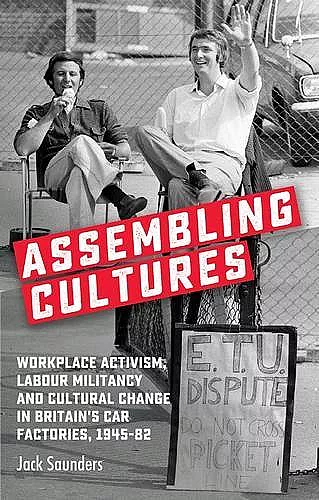Assembling Cultures
Workplace Activism, Labour Militancy and Cultural Change in Britain's Car Factories, 1945-82
Format:Paperback
Publisher:Manchester University Press
Published:11th May '21
Should be back in stock very soon

In British political discourse the idea that in the 1970s trade unions 'ran the country' has become a truism, a folk mythology invoked against the twin perils of socialism and strikes. But who exactly wielded power in Britain’s workplaces and on what terms?
Assembling cultures takes a fine-grained look at factory activism in the motor industry between 1945 and 1982, using car manufacturing as a key case for unpicking important narratives around affluence, declinism and class. It traces the development of the militant car worker stereotype and looks at the real social relations that lay behind car manufacturing’s reputation for conflict. In doing so, this book reveals a changing, complex world of social practices, cultural norms and shared values and expectations.
From relatively meagre interwar trade union traditions, during the post-war period car workers developed shop-floor organisations of considerable authority, enabling some to make new demands of their working lives, but constraining others in their more radical political aims. Assembling cultures documents in detail a historic process where, from the 1950s, groups and individuals set about creating and reproducing collective power and asks what that meant for their lives. This is a story of workers and their place in the power relations of post-war Britain.
This book will be invaluable to lecturers and students studying the history, sociology and politics of post-war Britain, particularly those with an interest in power, rationality, class, labour, gender and race. The detailed analysis of just how solidarity, organisation and collective action were generated will also prove useful to trade union activists.
'Much more could be said about a book which combines richness in detail with a compelling central argument. Saunders’ work makes a substantial contribution not just to studies of the labour movement but to contemporary British history more widely, and beyond the discipline on the importance of historicising working-class agency. It is also, ultimately, a hopeful book: it emphasises the possibilities for building new bonds of solidarity, democratic forms of organisation, and power in the workplace. All of which we will be in desperate need of in the coming years.'
Contemporary British History
'Saunders’ study makes important interventions in several historiographical. His approach suggests the potential of ‘new histories of both labour and political culture, histories that situate subjectivities, behaviours and attitudes within the lived experiences that people shared in the workplace’ (11), and it is very much to be hoped that other scholars take up this call. debates.'
Journal of Contemporary History
'Assembling Cultures, is a timely intervention. [...] A testament to the success of this book is its applicability to areas beyond industrial relations.'
Twentieth Century British History
'[…] an interesting account of the emergence and development of workers organisation in car assembly, developing the labour history which had been focused on the emergence of organisation and culture in mining, docks, textile mills, building sites, or other ‘traditional’ work cultures.'
Journal of Labor and Society
ISBN: 9781526155979
Dimensions: 216mm x 138mm x 16mm
Weight: 363g
312 pages